Why is it so hard to find the right medications to help people with Fragile X syndrome? Just as Fragile X affects individuals differently, medications do as well. This project aims to bring personalized medicine to Fragile X syndrome.
Read moreResearch
Preclinical Testing of High Fat/Low Carb Diets in Fragile X Mice and Cells
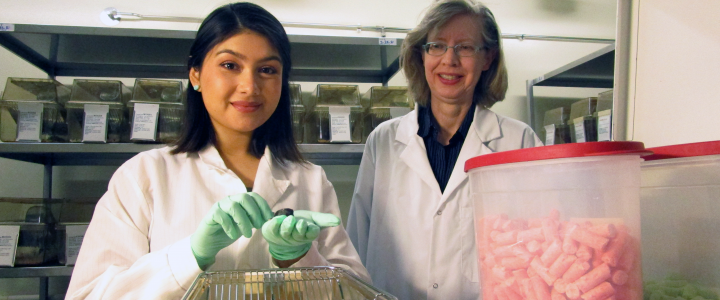
With a $90,000 research grant from FRAXA, Dr. Cara Westmark’s team will use mice to determine if more palatable Atkins-type diets can improve sleep and boost learning skills for those with Fragile X syndrome.
Read moreFRAXA Drug Validation Initiative (FRAXA-DVI)

The FRAXA Drug Validation Initiative (FRAXA-DVI) provides speedy, cost-effective, objective preclinical testing of potential Fragile X treatments. FRAXA-DVI uses in-vitro systems, behavior batteries, and gene expression and peripheral biomarker platforms to validate investigational new drugs and repurposed available compounds in Fragile X syndrome (FXS).
Read morePharmacotherapeutic Effects of Cannabidiol (CBD) in Fragile X syndrome (FXS) and Autism Spectrum disorder (ASD)

This study will test CBD (cannabidiol) treatment in male and female Fragile X mice to learn how and why it works and whether gender affects responses to CDB treatment. Along with clinical trials, this study will help us to understand and optimize the potential of CBD as a behavior-regulating treatment for Fragile X.
Read moreCellular-Specific Therapeutic Targeting of Inhibitory Circuits in Fragile X Syndrome
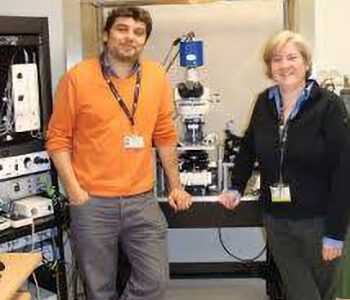
Studies have shown that the function of inhibitory networks is disturbed in Fragile X. This abnormality is not well understood but appears to be secondary to abnormalities in metabotropic glutamate and endocannabinoid systems. With a $90,000 grant from FRAXA, Dr. Molly Huntsman’s team examined how these networks interact and how inhibitory deficits can best be remedied.
Read moreAuditory Dysfunction in Fragile X Syndrome in a Mouse Model of Fragile X
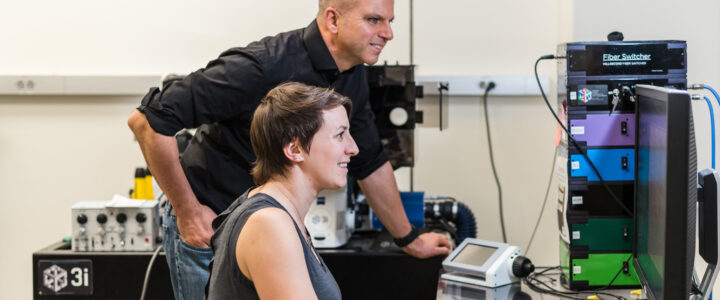
With a $90,000 grant from FRAXA, Dr. McCullagh and Dr. Achem Klug at the University of Colorado investigated whether auditory neural circuits are altered in Fragile X mice. They saw minor differences in these mice compared to B6 (control) mice in several measures of auditory acuity. Fmr1 mice had increased latency to the startle response for almost all conditions compared to B6 mice, suggesting altered timing to acoustic cues. These experiments show that, consistent with patient reports and anatomical/physiological data, the auditory system is altered in a mouse model of FXS, though with some potential compensation leading to a subtle behavioral impact.
Read moreScreening Combinatorial Pharmacological Therapies for Fragile X Syndrome
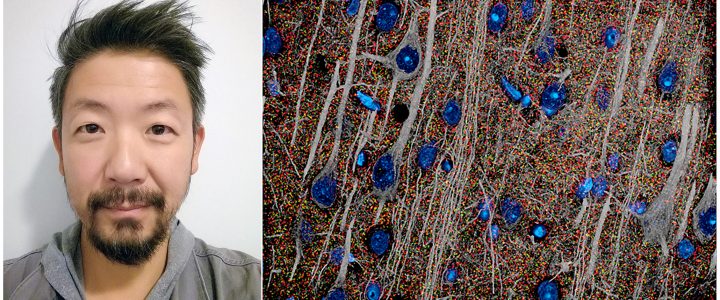
FRAXA Research Foundation has awarded a $90,000 research grant to Stanford University principal investigators Dr. Philippe Jacques Mourrain and Dr. Gordon Wang, along with postdoctoral fellow, Dr. Rochelle Coulson. They are evaluating additive effects of combinatorial drug treatments to correct a broad spectrum of deficits observed in Fragile X syndrome.
Read moreGenome-wide Screen for FMR1 Reactivation in Human FXS Neural Cells

Drs. Mahmoud Pouladi and Kagistia Utami at the Agency for Science, Technology and Research (A*STAR) in Singapore were awarded a $67,500 research grant from FRAXA Research Foundation and that led to much greater governmental funding to expand this work. Their goal is to reactivate the gene which is silenced in people who have Fragile X syndrome.
Read moreCholesterol-Dependent Changes in Fragile X Astrocytes

FRAXA Research Foundation has awarded $45,000 to Dr. Maija Castrén, of the University of Helsinki, Finland. Dr. Castren is working with Dr. Iryna Ethell, at the University of California at Riverside, to uncover mechanisms behind beneficial effects of lovastatin and cholesterol-dependent changes seen in the Fragile X brain.
Read moreConsidering Available Drugs for Fragile X: My Favorite Combination (So Far)

Which of the available drugs are best for fragile X? We tend to think of drugs according to their primary activity in the body, but very few drugs are totally selective and specific. There are differences between drugs in any given class, and these differences may be critical. Most drugs have “off-target” effects which are usually considered side effects, and it is these side effects which can have key advantages, in some cases.
Read morefNIRS to Measure Treatment Response in Young Children with Fragile X
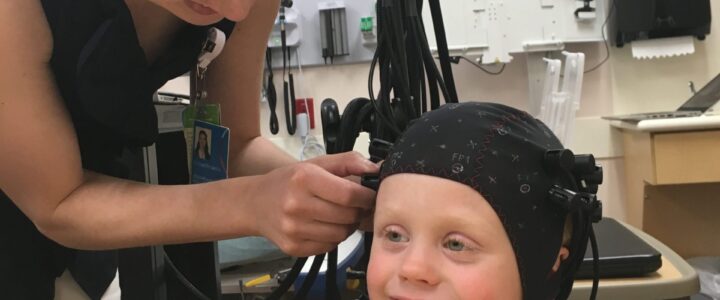
FRAXA Research Foundation has awarded a $90,000 research grant to Dr. Craig Erickson and Dr. Elizabeth Smith at Cincinnati Children’s Hospital to test functional near-infrared spectroscopy (fNIRS), in children who have Fragile X syndrome. fNIRS is safe, non-invasive, and easily-tolerated. It uses light sources and sensors on the scalp to build a heat map of the brain in action.
Read moreTargeting Adiponectin to Treat Fragile X Syndrome

FRAXA Research Foundation has awarded a $30,000 research grant to principal investigator Brian Christie, PhD, and postdoctoral fellows Jonathan Thacker, PhD, and Luis Bettio, PhD, at the University of Victoria. They are investigating whether boosting the hormone adiponectin can effectively treat Fragile X syndrome. This project is funded in partnership with the Fragile X Research Foundation of Canada, which is providing an additional $15,000.
Read moreHealx Raises $56M to use AI to Find Treatments for Fragile X & Other Rare Diseases

Healx has secured $56M in new financing to build a clinical-stage portfolio for rare diseases, including treatments for Fragile X syndrome, and to launch a global Rare Treatment Accelerator program. Where the traditional drug discovery model takes more than a decade and can run into the billions of dollars, Healx’s AI-driven approach makes the process faster, more efficient and cost-effective.
Read moreDeep Molecular Profiling of Fragile X Mouse and Human Cells

FRAXA Research Foundation has awarded $90,000 to Dr. Joel Richter, Principal Investigator, and Dr. Sneha Shah, Postdoctoral Fellow, at the University of Massachusetts Medical School. They are using human induced pluripotent stem (iPS) cells to analyze gene expression in Fragile X syndrome.
Read moreTargeting Mitochondria in Human Fragile X Syndrome Neurons

FRAXA Research Foundation has awarded a $90,000 research grant to principal investigator Dr. Xinyu Zhao and postdoctoral fellow Dr. Minjie Shen at the University of Wisconsin. They are investigating whether drugs which boost mitochondria — which provide the energy for cells — could treat Fragile X syndrome. Dr. Zhao explains in this video.
Read moreCorrecting Sensory Processing in Fragile X Mice by Modulating Kv3.1

FRAXA awarded a $90,000 grant to Carlos Portera-Cailliau, PhD and Nazim Kourdougli, PhD at UCLA to investigate whether a novel drug can rescue sensory processing deficits in Fragile X mice. People with Fragile X have similar problems in sensory processing. This new drug acts on Kv3.1, a promising Fragile X treatment target also being pursued by UK-based Autifony Therapeutics based on FRAXA-funded research done at Yale.
Read moreGene Therapy Translational Studies for Fragile X Syndrome

With this $90,000 award from FRAXA Research Foundation, Drs. Ernest Pedapati, Christina Gross, and student Lindsay Beasley will pursue preclinical gene therapy approaches using AAV (adeno-associated virus) vectors for treating Fragile X syndrome at Cincinnati Children’s Hospital. Dr. Craig Erickson elaborates about this in this video.
Read moreClinical Trial of Metformin for Fragile X Syndrome

Metformin is commonly prescribed to control high blood sugar in type 2 diabetes. With a $50,000 grant from FRAXA Research Foundation, Dr. Artuela Çaku and Dr. Francois LePage are conducting an open-label clinical trial of metformin for children and adults with Fragile X syndrome, at the University of Sherbrooke in Canada.
Read moreDevelopmental Profile of Glutamatergic Synapses in Fragile X

FRAXA Research Foundation awarded a $90,000 research fellowship to Dr. Tue Banke. With this award, Dr. Banke investigate how glutamate receptors at neuronal synapses – essential building blocks of learning and memory – are impacted in Fragile X syndrome.
Read moreReintroducing FMRP via Tat to Reduce Symptoms of Fragile X Syndrome

FRAXA Research Foundation and the Fragile X Research Foundation of Canada awarded a grant of $100,000 over two years to Dr. Raymond Turner at the University of Calgary in Alberta, Canada. Dr. Turner and postdoctoral fellow Xiaoqin Zhan, PhD are attempting to reactivate a segment of FMRP to reverse symptoms of Fragile X in a mouse model of the disease to reduce abnormal behaviors.
Read moreEnhancing NMDA Receptor Signaling to Treat Fragile X Syndrome

Dr. Stephanie Barnes investigated the role of NMDA receptors as a FRAXA Postdoctoral Fellow in Dr. Emily Osterweil’s laboratory at the University of Edinburgh from 2016-2018. With an additional year grant from FRAXA, she then continued her work to identify novel targets and test pharmacological therapies in the Fragile X mouse model at the Picower Institute at MIT with Dr. Mark Bear. Results published.
Read moreScreening 2,320 FDA-Approved Drugs for Potential Treatment of Fragile X

FRAXA Research Foundation has awarded a $90,000 grant to Principal Investigator Dr. Sean McBride and Postdoctoral Fellow Dr. Karen Joyce, at Rowan University, to screen all 2,320 FDA-approved drugs on both mouse and fly models of Fragile X syndrome. Those drugs which show promise will be tested in more detail for potential to treat Fragile X in humans.
Read moreNovel Modulators of Potassium Channels to Treat Fragile X

With funding from FRAXA over 2015-2017, the Yale University team of Leonard Kaczmarek, PhD showed that the firing patterns of auditory neurons in response to repeated stimulation is severely abnormal in Fragile X mice. Based on these results, they are collaborating with the UK-based company Autifony to develop advanced compounds which may reverse these deficits.
Read moreCoffee, Tea, and Chocolate: Adenosine Receptors in Fragile X

Caffeine is the most popular smart drug in the world. With a $90,000 grant from FRAXA Research Foundation, Alberto Martire, PhD and Antonella Borreca, PhD in Rome, Italy are investigating adenosine receptors antagonists to treat Fragile X syndrome. Compounds which are able to block adenosine receptors are commonly found in tea, chocolate, and coffee.
Read moreFinding Fragile X Biomarkers – From Transcriptomics to Behavior in Patients

With this $20,000 award from FRAXA Research Foundation, Dr. Vanderklish and collaborators at Scripps Research Institute, the University of Chile, and the FLENI Institute in Argentina are analyzing patterns in gene expression in blood cells of patients with Fragile X syndrome. They are using “transcriptomics” which can produce a time-sensitive signature of an individual person. This is the first time that all these different levels of study – from transcriptomics to behavior – have been done for individual patients with Fragile X.
Read more
